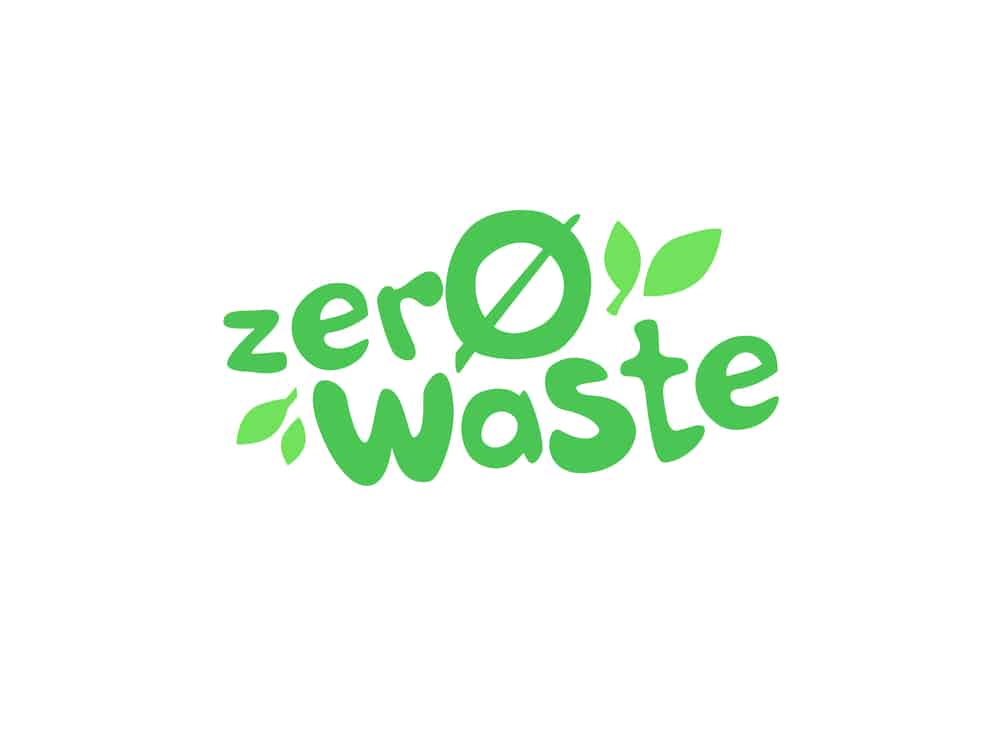I’m going green to achieve a zero-waste lifestyle these days.
Today, the zero-waste movement has taken the literal world by storm. Put simply, to send nothing to landfills.
Absolutely nothing, which is excellent! This means no disposable products, no food packaging, and no thruway beverage containers.
Talk of human beings who care so much about the environment. They even ‘go green’ to protect it.
Adopting a zero-waste lifestyle is the most excellent way of achieving this noble goal.
People will endeavor to reduce or eliminate the use of plastic materials as much as possible.
If you feel compelled to join the cause, you should be ready to implement reusable and sustainable solutions.
Besides, it means an ongoing journey of replacing everything, ranging from clothes to hygiene products and more.
This is practical, but is zero waste actually sustainable? Let’s find out.
What is Zero-Waste?
The zero-waste lifestyle aims to solve the menace of growing waste all over the world.
If everyone takes up this matter at a personal level, then maybe we can make significant strides.
Living a zero-waste lifestyle means giving up on the convenience of disposable products. These include:
- food packaging
- beverage cups.
- Fewer recyclable products
The concept of a zero-waste lifestyle is to ensure that you generate no waste to go to the landfill.
It doesn’t mean purchasing items in recyclable packaging and recycling them.
Even though recycling is a sustainable activity, it isn’t the ultimate solution to zero waste management.
We still use a significant amount of energy and resources.
The recycling process consumes energy. In a perfect zero waste management program, the primary goal is to avoid sending trash to landfills.
But the world we live in isn’t zero waste. It poses a challenge to the movement as so many things are beyond a single person’s control.
Therefore, it is almost impossible for everyone to avoid sending no trash to the landfills if you are in this movement.
The emphasis of the zero-waste campaign is for everyone to do as much as they can personally.
At the moment, there are no solutions to achieve total perfection.
You can start by reducing your single-use plastic and inspire other people to have less waste impact on the environment.
Zero Waste Social Media Impact
Judging by the thousands of growing social media accounts for zero waste living, it is easy to fall in love with the idea.
It represents a minimalistic lifestyle that focuses on environmental cleanliness and the use of recyclable high-quality products.
It is living without sending things to the trash.
Is Zero Waste Actually Sustainable?
The answer is yes. There is no doubt that a zero-waste lifestyle will make lots of difference in our environment’s stress and impact.
However, we need to adopt specific components to create a sustainable zero-waste lifestyle. These are
- Reducing our carbon footprint
- Offer support to your local economy
- Handling food responsibly
- Use of homemade natural products
- Reducing toxins levels in the environment
Let’s curate them in a detailed manner.
Reduce Carbon Footprint
Think about climate change. We know that we still burn significant carbon amounts that warm the planet and create the greenhouse effect in our atmosphere.
Zero waste living is not about the energy we consume but rather the waste we generate.
The waste you produce indeed has no direct impact on climate change. But consider the amount of carbon escaping to the atmosphere as you transport the waste to landfills.
A carbon footprint is the amount of carbon one uses to achieve daily objectives. These include
- the energy consumption to cool or heat your home
- The gas/fuel consumption of your car while driving
- Energy in production units.
It is impossible to live without using some form of energy.
Therefore, everyone leaves a carbon footprint.
There are ways to calculate your carbon footprint so that you can work on ways to reduce it. Such ways include
- Reducing your general consumption level
- Cut on driving
- Cut on meat products, especially from non-local suppliers and more.
Offer Support to Your Local Economy
There are lots of benefits that can come from you supporting your local economy in various ways.
If the goal is to reduce your carbon footprint, you should look into ways to maintain your local economy’s stronghold.
It involves offering financial aid to families and small businesses near you.
By strengthening the resilience of your community, you can battle uncertainties from climate change like
- Natural disasters like floods and mudslides
- Crop failures
- Rising sea levels
- Economic issues
In relation to zero waste, this means targeting zero waste products from your local area.
Instead of buying zero waste products that come from halfway across the globe, try local producers.
You will support your local economy as you reduce your carbon footprint.
Handling Food Responsibly
The world seems to spin on a plastic world frenzy.
Plastic is at the core of every food packaging, and the obsession is too much.
Yet, other things contribute to zero waste management besides plastic food packaging.
For example, where is the food you buy come from?
If it is from a local producer, then less transport time means less carbon footprint.
Also, remember the benefits of supporting your local economy by buying “home-grown” foods.
How do your local producers grow food? Do they have organic certification? While small farms may struggle to acquire an organic certification, find the ones that grow foods in ways that sustain the ecosystem.
The farms that can afford organic certification are multinational monoculture farms. These are farms that grow one crop.
You can follow the Good Agriculture practices (GAP) or check your local farmers market for Community Supported Practices (CSA).
Another way to sustain zero-waste food management is by growing food yourself.
Home Made and Natural Products
If you’re looking for a full-proof to sustain a zero-waste lifestyle, consider using natural products.
It is sad to note numerous products in our households pollute air or water at some capacity.
Regardless, it either affects us or our environment.
Every product you use, flush down the drain or throw out, contains ingredients that leave some environmental impact.
But we can lower how we impact our immediate environment by using natural products.
Making your products is an even better solution but not so many can do so.
You can make things like
- toothpaste,
- facial oil, and
- soap from natural products.
This way, you can be sure the ingredients have little or no environmental impact.
Environmental Toxins
There seems to be no way to avoid environmental toxins. They are everywhere we look.
- The phthalates in perfumes,
- BPA in canned goods and
- VOC in the home furniture.
All these combine to affect the air quality we breathe in our homes.
Consumer items lead to the off-gassing of materials that in turn lead to soil and water contamination.
The scope of environmental toxins on zero-waste living is low. However, the impact is on our personal health.
For example, some non-stick cookware contains a PFC chemical substance.
Such utensils may cause harm to your health.
Zero waste means checking every item that enters or leaves your house.
It includes beddings, furniture, toiletry, and Non Toxic kitchen items.
Consider non-plastic items like stainless steel water bottles, natural bristle brushes, and glass food containers.
Frequently Asked Questions
Can you manage zero-waste Grocery Shopping?
Yes, and very simple! There are plenty of ways that you can go to zero-waste shopping for your groceries.
If you shop from stores with large bins, bring your container, jar, or bags to carry your shopping items.
Consult with local stores and find out if they have zero waste policies.
Is Zero Waste Good for Your Health?
Yes, zero waste is good for your health. If you reduce the amount of contact your skin and food comes with plastic every day, we can say the battle is half complete.
Try to avoid the packaging and storage of food in plastic containers to expose yourself to less BPA.
BPA is harmful to your health because it contains potential
- Carcinogen
- Phthalates
- Endocrine disruptors.
Whenever you can, always avoid plastic-wrapped snacks and foods.
Overall, you should consume more healthy food than processed foods. For instance, consider taking food like bulk coffee beans, fresh bread, and fresh produce.
They come package-free.
Most products that come plastic package-free are more natural and exposes your body to fewer chemicals.
Why is Plastic not Zero Waste?
It is because it is non-renewable and comes from fossil fuels from the oil industry.
What this means is that as we drill for oil to make plastics. Hence it is an unsustainable practice.
Additionally, only 91% of plastic gets recycled. When plastics reach landfills, they release greenhouse gases that affect the climate.
Plastic will take over one hundred years to disappear. All plastics ever created are still on earth.
It is because plastics break down into microplastics that find their way to the ocean.
Is shopping for secondhand items zero waste?
Yes. It is because secondhand shopping takes away items from the waste stream.
Therefore, fewer items reach landfills. Secondhand items also reduce demand for buying new products.
If you’re considering zero-waste living, then take time before buying any new things.
Check out secondhand clothing stores and apps, or head to thrift stores. You will not only save money but also have less environmental impact.
Conclusion
A zero-waste lifestyle doesn’t mean sustainable. However, you can add critical values to your day-to-day activities.
The important thing is to address plastic waste pollution by reducing the use of plastic-related items.


